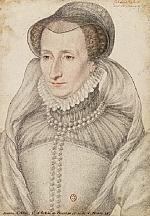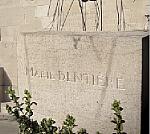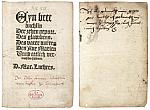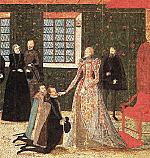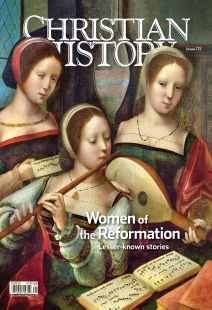“Honorable and holy”
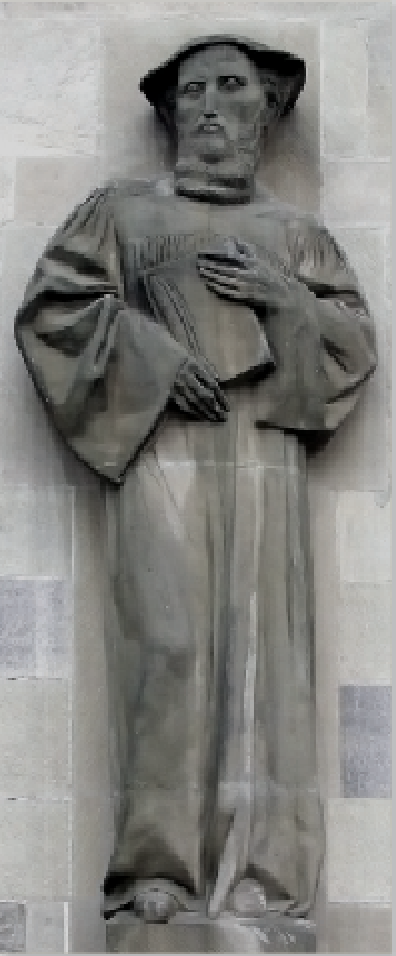
[Bullinger]
THE WOMAN WAS TAKEN from and out of the side of man, and not from the earth, lest any man should think that he had gotten his wife out of the mire; but to consider that the wife is the husband’s flesh and bone and therefore to love her; yet was she not made of the head, for the husband is the head and master of the wife. Neither was she made of the feet (as though thou mightest spurn her away from thee and nothing regard her) but even out of thy side, as one that is set next unto man to be his help and companion. And as the bone of the flesh is strong so ought the husband to be the strength, help, and comfort of the wife.
As soon now as the woman was set before Adam he [ac]knowledgeth immediately that she was for his purpose, that he loved her well and that he could find in his heart to love her as one that was of his own kind, of his own blood, flesh of his flesh and bone of his bone. . . .
Therefore is wedlock a covenant . . . a right knot unto God acceptable, a yoking together of one man and one woman with the good consent of both. Here also must we add why they are and should be yoked together: even to the intent that they may live honestly and friendly the one with the other, that they may avoid uncleanness, that they may bring up children in the fear of God, that the one may help and comfort the other.
What God hath coupled together, let not man separate. Therefore must it be considered not only whether two persons come together, but whether it be done with God or no. That thing is with God which is not done against his commandment and words. There be many whom God coupled not together, but carnal lust, money, good flattery. . . . Therefore in going about marriage a Christian man must first look that in handfasting himself to a woman he make no divorce of the true faith. . . .
Drinking virtue
In the second book of Moses [Exodus], the 22nd chapter, doth God command thus; if a man beguile a maiden that is not betrothed and lie with her, he shall endorse her and take her to his wife; if her father refuse to give her unto him, he shall pay money according to the dowry of virgins. Here doth God give the father authority to take his daughter from the man to whom she is promised by the laws. . . .
[Parents] know well also that to be fruitful or barren cometh of God. Therefore do they [ac]knowledge that they have not the children of themselves but of God. And this cause is no small or light thing. For to have children is the greatest treasure. For in the children do the parents live (in a manner) even after their death. And if they be well and luckily brought up God is honored by them, the public [welfare] is advanced, yea all men (their parents also) are the better for it. . . .
Wedlock is honorable and holy; therefore must not we as some lesser persons cast away good manners and become like unreasonable beasts . . . a great work and holy ordinance of God which defileth or unhalloweth no man save him that taketh it upon him with an unclean heart. . . .
Great joy and quietness it bringeth to the parents to see their children godly and virtuously brought up. . . . The women should nourish their own children with their own breasts or else if they may not for weakness yet ought they to seek honest and godly nurses of sober language that with their milk they may drink also virtue. And the parents, especially the mother, must endeavor to speak first to the child perfectly plain and distinct words, for as they be first informed to speak they will continue. . . .
And even from infancy let the parents tell their children no fables nor lies, nor no vain nor light conversation but that only which is godly, honest, grave, and truthful let it be planted in their hearts. They must teach them first certain godly sentences though they yet cannot understand them, let them commit them to memory and practice them in speech till they may hereafter the better perceive them.—Heinrich Bullinger, Der Christlich Eestand (1540); from the translation by Miles Coverdale, The Christen State of Matrimonye (1541), spelling modernized.
By Heinrich Bullinger
[Christian History originally published this article in Christian History Issue #131 in 2019]
Heinrich Bullinger’s Der Christlich Eestand (Christian Marriage), translated into English by Bible translator Miles Coverdale, was one of the most popular books about marriage on both the Continent and in England. These excerpts from its theological and practical instructions give us insight into the roles of women and their lives in Reformation-era Protestant families.Next articles
Like mother, like daughter?
Marguerite de Navarre and Jeanne d’Albret shaped French religion for generations
S. Amanda Eurich“A very useful epistle”: Marie Dentière
In 2002 Dentière received belated recognition; her name was added to the Wall of the Reformers in Geneva.
Mary B. McKinleyOur first woman reformer
Argula von Grumbach proclaimed “no woman’s chit-chat, but the Word of God”
Peter MathesonChristian History Timeline: Women of the Reformation
The Reformation through women's eyes
the editors



